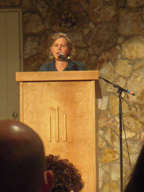In her first year as president of Union Theological Seminary, Serene Jones called on John Calvin as one of her most valuable mentors.
Calvin not only understood theology, he also understood the way institutions are run and managed, she said, drawing several similarities between Calvin’s setting and her own in New York City.
Her July 9 speech, “Calvin, Creation, and the Holy Spirit,” was part of the July 8-11 Calvin Jubilee conference here, celebrating Calvin’s 500th birthday.
In Geneva, Calvin lived in a global city of his time, Jones said. Geneva was marked by immigration and a diversity of classes, races and cultures. The city was also home to a massive technological revolution, serving as the book publishing center of Europe.
“He gives us a capacity of imagination,” Jones said. “I think of Calvin most often as a crafter of souls.”
Jones said she often sees Calvin in three roles. The historically evangelical Calvin lived a pious life. The liberal church Calvin was intellectually focused and active in social justice and the political life of the church. The secular humanist Calvin gave up all idols in the quest for knowledge.
What binds these images together is a narrative of redemption, Jones said.
It’s helpful to cast the three voices in a “kind of sibling rivalry over a very constrained set of imaginative possibilities,” she said.
Jones also discussed demographics in her speech, touching on two large demographic groups in New York City. One is made up of young, Latino Pentecostal Roman Catholics who are under 30, not college educated and have several young children. Another are religiously unaffiliated, with some religious background but without a connection to a church. They often get their spiritual fulfillment from volunteering, meditation and yoga.
These two groups are bound together by the community aspect of religion, Jones said. They find a tactile joy in communities of faith and often think of religion in terms of the practical daily life it enables. There is a sense of importance of ethical engagement, that to be a Christian is to work against injustice.
What do these groups mean in terms of Reformed tradition? Calvin considered the centrality of the aesthetic, Jones said. He believed that knowledge is not only cognitive, but that desire matters.
“We are called as people of faith, and not to love God simply out of obligation, but because we passionately, and with our entire being, we simply desire God,” she said.
Jones discussed what kind of churches will live in this way. At Union, the students are diverse in race and class, and many are politically liberal and evangelically zealous, she said, adding that they live in the moment and see the connection of politics and the world.
Identifying the power of progressive vision in itself is spiritual, she said, adding that it’s important to see that the work itself matters without even looking at the results or “fixing” the problem.

